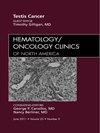免疫效应细胞相关的噬血细胞淋巴组织细胞病样综合征(IEC-HS)
IF 2.5
3区 医学
Q2 HEMATOLOGY
引用次数: 0
摘要
免疫效应细胞相关的噬血细胞淋巴组织细胞病样综合征(IEC-HS)是过继细胞治疗的并发症。IEC-HS表现为高炎症的临床表现和高炎症的替代指标,如血清铁蛋白和肝转氨酶升高,细胞计数减少,低纤维蛋白原血症,类似于原发性和其他形式的继发性噬血细胞淋巴组织细胞增多症。尽管如此,这是一种医源性并发症,由t细胞介导的抗癌靶向过程中诱导高炎症途径引起。与细胞因子释放综合征、iec相关神经毒性综合征和iec相关血液毒性不同,IEC-HS可危及生命。确定IEC-HS,优化治疗策略和使用支持性护理对改善结果至关重要。本文章由计算机程序翻译,如有差异,请以英文原文为准。
Immune Effector Cell-associated Hemophagocytic Lymphohistiocytosis-like Syndrome (IEC-HS)
求助全文
通过发布文献求助,成功后即可免费获取论文全文。
去求助
来源期刊
CiteScore
4.10
自引率
0.00%
发文量
86
审稿时长
6-12 weeks
期刊介绍:
Hematology/Oncology Clinics updates you on the latest trends in patient management, keeps you up to date on the newest advances, and provides a sound basis for choosing treatment options. Under the direction of an experienced guest editor, each issue focuses on a single topic in hematology and oncology, including hemostasis and thrombosis, molecular and cellular basis of hematology, coagulation disorders, and cancers—bone, gastrointestinal, head and neck, lymphomas, neuroendocrine, breast, renal cell, melanoma, and more.

 求助内容:
求助内容: 应助结果提醒方式:
应助结果提醒方式:


